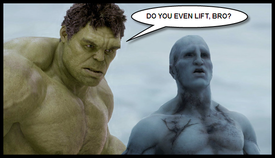Sometimes you have to give up...

vtmoon
Posts: 3,436 Member
Today I found my self trying to explain to someone on CCFaG that there IS actually a relationship between getting sunburned and temperature.
I keep forgetting that MFP is open to everyone and science might be lacking for some.
So, my question is when do you decide to give up on a conversation or a debate? once you realize they are lacking in certain realms of knowledge or common sense? or after you try and help them see the light? or just never give up on them until the get it or they quit?
I keep forgetting that MFP is open to everyone and science might be lacking for some.
So, my question is when do you decide to give up on a conversation or a debate? once you realize they are lacking in certain realms of knowledge or common sense? or after you try and help them see the light? or just never give up on them until the get it or they quit?
0
Replies
-
I think the correct steps are
1)try
2)give up
3) mock0 -
I think the correct steps are
1)try
2)give up
3) mock
I always get those out of order.0 -
I think the correct steps are
1)try
2)give up
3) mock
depending on the level of derp sometimes you have to just skip right to #30 -
I had to stop reading all of it...
I think I genuinely prefer to be dumb sometimes *sigh* Such a sad life.0 -
I have no shame on admitting when I'm wrong but can someone with a background in science read over this thread and let me know that I'm either a moron or some how just not getting threw to that many people?
http://www.myfitnesspal.com/topics/show/1166249-i-heard-they-cancelled-school-in-florida-today0 -
I had to stop reading all of it...
I think I genuinely prefer to be dumb sometimes *sigh* Such a sad life.
Probably the most profound thing I've read on the internet in days.0 -
Today I found my self trying to explain to someone on CCFaG that there IS actually a relationship between getting sunburned and temperature.
I keep forgetting that MFP is open to everyone and science might be lacking for some.
So, my question is when do you decide to give up on a conversation or a debate? once you realize they are lacking in certain realms of knowledge or common sense? or after you try and help them see the light? or just never give up on them until the get it or they quit?
http://www2.epa.gov/sunwise/calculating-uv-index
http://www2.epa.gov/sites/production/files/documents/uvradiation.pdf
"The sun’s angle varies with the seasons, causing the intensity of UV rays to change. UV intensity tends to be highest in the summer"0 -
I think the correct steps are
1)try
2)give up
3) mock
I go with
1) Mock
2) Mock and insult
3) Mock, insult, send taint photos0 -
I think the correct steps are
1)try
2)give up
3) mock
I go with
1) Mock
2) Mock and insult
3) Mock, insult, send taint photos
Now go away or I shall mock you a second time0 -
Today I found my self trying to explain to someone on CCFaG that there IS actually a relationship between getting sunburned and temperature.
I keep forgetting that MFP is open to everyone and science might be lacking for some.
So, my question is when do you decide to give up on a conversation or a debate? once you realize they are lacking in certain realms of knowledge or common sense? or after you try and help them see the light? or just never give up on them until the get it or they quit?
http://www2.epa.gov/sunwise/calculating-uv-index
http://www2.epa.gov/sites/production/files/documents/uvradiation.pdf
"The sun’s angle varies with the seasons, causing the intensity of UV rays to change. UV intensity tends to be highest in the summer"
Glad you came here! And yay for finding sources! UV intensity tend to be highest in the summer? I wonder how the temperature is during the summer?
I'm genuinely not trying to be mean and was doing my best to use kid gloves on the main forums to avoid a strike.
I'm going to do my best to explain the relationship between temperature and UV rays, and why temperature is a good indicator to help us determine when to use sunscreen. I'm going to assume a high school education and some college, so I don't need to explain everything in detail.
The sun is in a constant state of nuclear fusions. One of the side effects of a nuclear fusion is radiation. The sun radiation is emitted throughout our solar system. Planet earth where we live gets hit by a spectrum of that radiation energy. As humans we have been able to detect a couple of parts of the solar radiation spectrum. We divided those parts to UV (ultraviolet), Visible (sunlight), and Infrared ( or heat radiation). Heat on the surface of the Earth is mainly determined by the level of exposure that point on earth has to Solar radiation. The more exposed the hotter it will get, that is why some scientist worry about the Ozone layer because if we lose that O3 layer more of the solar radiation will get to the surface of the planet, particularly UV rays.
Now that I explained how UV and Infrared ( heat radiation) are both part of solar radiation, I will try to explain why temperature is a good indicator for someone to use sunscreen or sunblock to protect themselves from UV rays.
In order for the temperature to go up you need to introduce more energy to cause that change. So during the summer when the sun is closest to your location on Earth, Solar radiation has less distance to travel versus when it does during the winter. With the distance traveled by Solar radiation being less, less of the energy of the Solar radiation is dissipated in space. This allows the Solar radiation to give planet Earth more energy which is given in the form of heat. And that causes the planet to be hotter during the summer time when the sun is closer.
So, one can see that with less Solar radiation wasted the planet gets hotter and the Temperature rises. But we forgot that with less Solar radiation wasted that also means that less UV (part of the radiation) will be wasted. Which also means the Earth will be exposed to more UV rays when the temperature is hotter.
Therefore, the temperature on a certain part on the planet has a direct relation to the amount of UV rays being exposed to that part of the planet.
So one may conclude that it would be wiser to use sunscreen when the temperature due to the sun is higher than normal to avoid sunburns. 0
0 -
So logic would then dictate that one would be less likely to sunburned on the summit of Mt. Everest on July 20th than in Death Valley California because the temperature is less on Everest?0
-
I think the correct steps are
1)try
2)give up
3) mock
I go with
1) Mock
2) Mock and insult
3) Mock, insult, send taint photos
Now go away or I shall mock you a second time
Your mother was a hamster.....0 -
If you're trying to make something silly sound scientific, use the word "therefore." Better yet, try "ergo."0
-
So logic would then dictate that one would be less likely to sunburned on the summit of Mt. Everest on July 20th than in Death Valley California because the temperature is less on Everest?
The original example was to warm places. Everest you are higher up and have a ton of reflective snow around you that will be catching a lot of the short wave UV rays and bouncing them back up, so I don't have enough experience nor read enough to give you an answer.
If you are trying to keep the variables set then compare the same spot on Death Valley or Everest with respect to the temperature change to that location locally or how it it is experienced by someone not used to the temperature change there a tourist from a colder climate.
Sunburn is just the reaction your body has to the amount of UV rays it is getting exposed to, in warmer climates more UV rays happen due more Solar radiation exposure. So the hotter it is the more it is indicating that there are more radiation and in term more UV rays as part of the collective radiation spectrum.0 -
If you're trying to make something silly sound scientific, use the word "therefore." Better yet, try "ergo."
Ya, too many research papers will make that one stick and QED.0 -
I think the correct steps are
1)try
2)give up
3) mock
depending on the level of derp sometimes you have to just skip right to #3
This!0 -
∴0
This discussion has been closed.







